It's a Perfect Summer: An Interview with Quino of Big Mountain
The Big Mountain in the 1990's took the world by storm with their reggae music. With hits like "Baby, I Love Your Way," "Touch My Light," and "Sweet, Sensual Love," the bands music was playing all over the world and on all major radio stations. You could not mistake the sound of Big Mountain because of Joaquin "Quino" McWhinney's beautifully unique and powerful voice. I got the opportunity to talk story with Quino about the bands return to the big stage and its certain rise into the hearts of many who love reggae's feel good vibe coupled with classic rock, blues, and other musical influences.
Be excited everyone, Big Mountain is back.
It's a Perfect Summer.
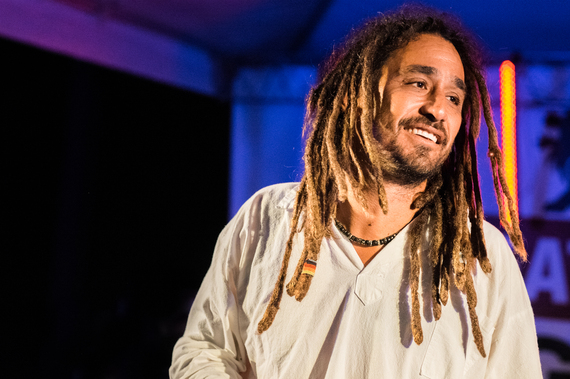
Photo Credit: Brad Puet
Quino (pronounced Keno) if you could tell us about yourself and about the band, Big Mountain. Also can you tell us about how you came up with the name?
My name is Quino. I'm a reggae musician. A Father. A husband. I've been playing in Big Mountain going on 21 years now.
The naming of Big Mountain is a really interesting story. When we were first starting out, our name was Shiloh. We were really linked into this revolutionary/activist café, on the campus of University of California- San Diego. It was called the Che Café, named after the revolutionary - Che Guevarra. We got asked to play a benefit for an organization who would take food and supplies to this Native American community who was being relocated. The land that they were living on was rich in land resources - coal, uranium - and there was a lot of mining going on. Of course, the people were being forced to move out. They were being removed from the land for those resources. The region that they were a part of is called the Big Mountain region. After the benefit, we got more involved. We would join in on the caravans in taking the food and supplies to them. We spent a lot of time on the reservation and spent a lot of time with the people. We got to know them well especially the elders. A lot of the young people either left or got jobs doing the mining so the ones who were left to suffer were the elders. We took a lot of pride in helping them out. Meanwhile we found out that the name Shiloh was owned by Don Henley of the Eagles. So we had to change and since we were so close to the struggle, we changed our name to Big Mountain.
Currently I'm the only member from the original Big Mountain band. Big Mountain is a band out of necessity. If we could do whatever we want, we'd be a much bigger band. Sometimes it's not feasible to be able to bring our whole crew together. So for the original members, logistically it can't or doesn't make sense. When the time comes, when the band is firing on all cylinders, I'd love to have the original crew come back into the fold. Right now, I have some young guns, some young warriors, to fill those original spots.
Big Mountain is a big band and we have some work to do. Hopefully we get everything going and get the big shows with the big tour buses and get the original band with the current band up and doing what we love to do.
Things just won't light up just because, it will take work and Big Mountain is going to do it.
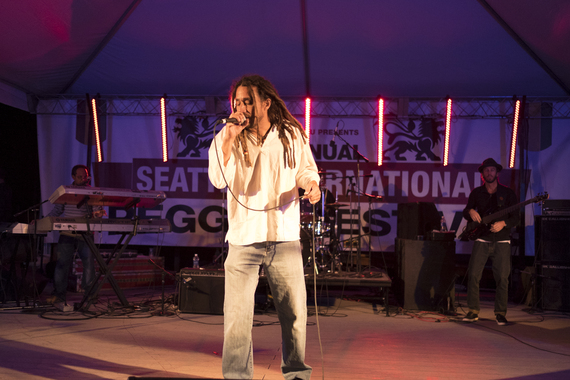
Photo Credit: Pele B
Big Mountain is up and at 'em again. Can you tell us a bit about how that's going for you guys?
Big Mountain is in the middle of a relaunch. We each went and started to work on different things. We would still work on little things here and there but for the most part really focused on our own things.
This music business can be a grind, man. There was a time when it was really hard to keep the whole thing going. We had a real good run in the 90's and lots of fun. We were a part of an amazing reggae tradition. We had a lot of gigs with Reggae Sunsplash. That was an amazing experience.
Then we had to take a break.
Now we're coming back to do this again. I've got a great group of guys that I'm working with. We're all very excited.
It's nice to be back. Also we just released our first album in 11 years, Perfect Summer. It really feels refreshing, man.
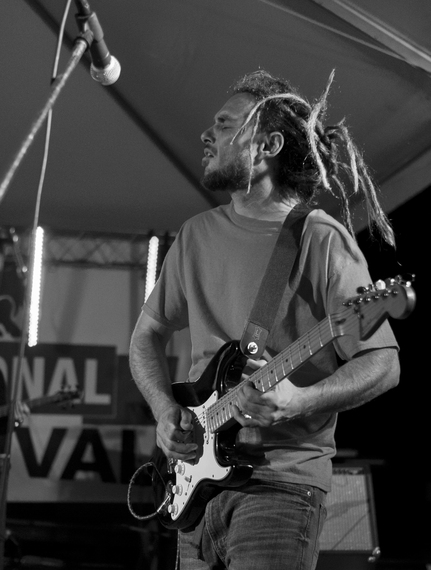
Photo Credit: Pele B
Tell us a little bit about your new album, Perfect Summer.
We wanted to come back with something different. We wanted to be different from what we did before and what others may be recording right now. It's also about incorporating influences that have been important in our whole career.
As we've matured we start to reach back into what we used to listen to. We would let those things seep in.
You know the first time around it was really important for us to not sound American for various reasons. We were a reggae band from California, touring with a bunch of Jamaicans and English guys. So we were self-conscious you know. We were insecure about our status as being an American reggae band. So as a result we did everything we could to not sound American. That was where our head space was at, at that time.
This time around I was very happy to let my American and British rock influence come in. I'm human right. I have a lot of influences and I didn't want that to stop with this record. My mind is always being influenced you know. Whenever we hit a road block while recording this record, we'd take a break, and we'd just jump onto YouTube and watch our rock and blues influences come in and help inspire us for Perfect Summer.
SO bands like the Eagles, Robbie Robertson, Eric Clapton, the Beatles, Van Morrison...all helped shape this album for us. I have spent so much time listening to reggae, it was nice to go back and listen to all those songs and records. I had always heard the big songs off those records but to go back now, at this point in my life, I got to really appreciate the obscure stuff. Not only was it influential musically for me, but it was a lot of fun. I re-educated myself on music. We re-educated ourselves on music. We would spend time looking at documentaries on Netflix. We learned so much spending hours and hours and hours learning about these classic bands and how they created their music.
So that's what this record is about. It's about us accepting the American sound. It's about us not running away from it like we did when we were younger. For instance I studied and relearned what I know about the blues. It's hard for someone younger to sing the blues. You know someone younger can't really sing the blues. They haven't suffered enough. But once you've suffered, you can understand the blues. You know, I've been through it all: marriage, divorce, heartbreak, being in love, and all of that. It was natural to incorporate that into our music this time around. We stumbled upon a style that works for us and I think will work well for this country. Perfect Summer is for the US. It's weird because the market is so fractured. What people want Big Mountain to play in South Africa is different than what they want us to play in Asia or in other parts of the world. So when we tour the world, we have to do our classic pop reggae set. In the US, we're almost starting over. We have pockets of strength in the country but we're really trying to cultivate our audience again and that's exciting. We will always have "Baby, I love Your Way" and it will always open doors but really its open game. The band is really excited for creating American reggae music.
Perfect Summer is a great American reggae album.
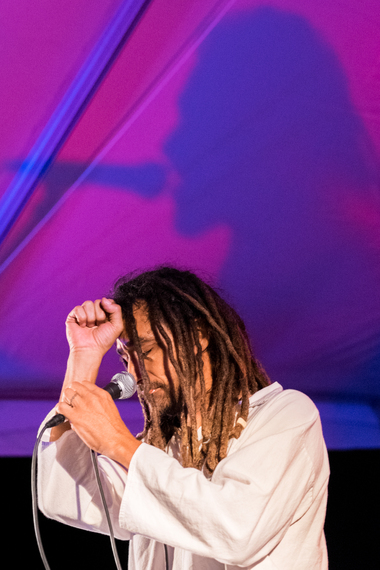
Photo Credit: Brad Puet
It's also very important especially with all the politically and socially charged issues happening in America nowadays that your music stays current along with the artistry and musicianship. Can you talk about how reggae music has influenced your work in the community?
Big Mountain has always tried our best to stay in the community and be conscious. It is important for us to let people know that we were conscious and well-read. Back in the day we disliked the label given to us as "pop reggae." That left us with a stigma a lot of the times thus the importance for us to stay in the community. We really did our best to understand the politics of the music and the politics of today you know.
We got involved in the Native American movement. We got involved with the environmental movement. Really what I latched onto was the immigrant rights movement. I'm from Southern California specifically San Diego. I'm Chicano. The border has always been an issue and still is now. Me, being Mexican, me living next to the border, I get to see it with my own eyes. I get to see how the border and this issue effects the lives of families and people. It tears people apart. It tears families apart.
I've written a lot of music about the border situation. I always try to be present and active in what I can do. Big Mountain is the same. We always will try to be current and know where the community may need us and our music.
We still stay very close to the struggle especially for immigrants and of course the indigenous people. We have a song on the new album called, "Vision." This song is about the conflict that is going on in Papa New Guinea. Half of this island is owned by Indonesia, the other half is its own sovereign country. We learned a lot about the conflict when we played a show out there about 2 years ago. We played with a band that was very involved with that struggle, Rize of the Morning Star band. Through our music we try to stay active.
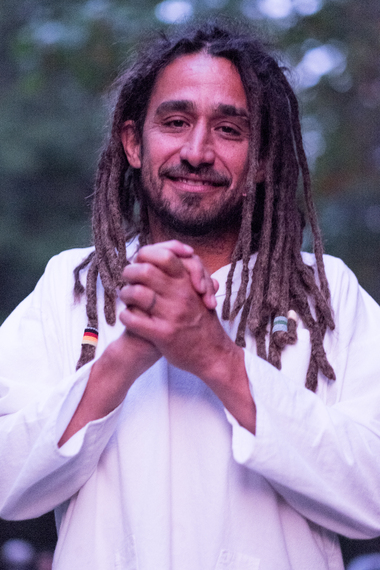
Photo Credit: Brad Puet
In closing, what would you like to tell the old and new fans of Big Mountain?
We've been doing this awhile and we've touched a lot of people out there. It seems that every night we play, I meet people who've been affected by our music. It's beautiful and it's very touching. It's nice to know that our music has been a part of people lives. A lot of things have changed but change is what life is all about.
I have a song called "Kalapana Way." When I was 20 years old, I backpacked the Big Island (Hawaii) for 3 months and ended up staying in Kalapana. I walked along that black sand beach. I lived in a tent up on the Pali. I watched the clouds come over me every day. Then years later I went back and it was all a big lava plot.
So the song is about accepting change. There's a lyric in the song:
You know that life will have its changes
May our memories never fade
Got to pick up all the pieces
But to our world today
Remember all the black sand beaches
That we lost along the way
This life will give us oh so much, oh so much
But it can also take away
We have to learn that change is going to happen. We have to have faith that it's the way its supposed to be. Big Mountain has changed. The world is changing for better or worst. We just want to build that big tent for everyone as it changes.
Big Mountain wants to be something that appeals to all people, of all colors, both young and old, really anybody and everybody who will love our music.
It's going to be a challenge especially in the current environment.
So to our fans, our friends and supporters is what I like to call them, we're excited to get to your heart and be a part of your life through our music.
